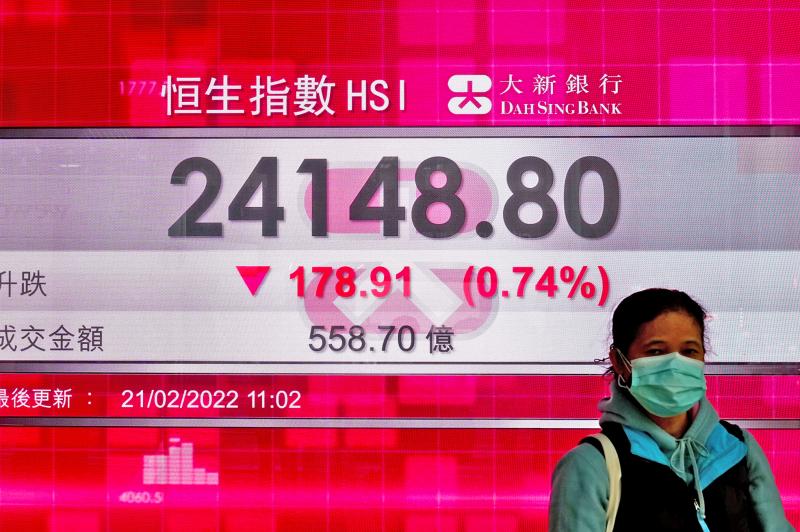Most companies that sold shares for the first time in Hong Kong this year have had to accept pricing at the low end of their expected range.
Tough conditions for first-time issuers globally — ranging from the prospect of higher interest rates to heightened geopolitical tensions — have added to local concerns in the territory since the middle of last year, as China tightened its grip for issuers abroad.
The increased risks are becoming evident deal after deal.

Photo: AP
Just six companies priced shares in Hong Kong this year, with five of them settling at the bottom of their marketed range, data compiled by Bloomberg showed.
The initial weeks of last year and this show starkly different conditions, with investors becoming more selective.
Pricing of fewer than one-third of the 19 initial public offerings (IPOs) that Hong Kong hosted during the same period last year fell at the lower end of the range.
The erosion in sentiment has extended to trading, with three of those shares that have already debuted changing hands a price lower than their listing. That contrasts with a 3 percent year-to-date gain for the Hang Seng Index, which is recovering from a 14 percent annual slump.
The trend would continue as long as there is a mismatch between valuations issuers expect and what investors consider the assets deserve, said Brian Freitas, an analyst on independent research platform Smartkarma.
Some IPOs had large cornerstone investor allocations, he added, indicating that “the broader market did not participate.”
“To get past this trend, issuers will need to lower their valuation expectations and their IPO prices, and then the IPOs will need to trade higher post-listing to build confidence that the issuers are leaving something on the table for investors,” Freitas said.
Separately, JPMorgan Chase & Co’s Ryan Holsheimer, head of cash equity and equity distribution for Asia-Pacific, is leaving Hong Kong after seven years with the firm, adding to a string of senior departures and relocations from the territory.
Holsheimer, 47, is to return to Australia to rejoin his family, and would be succeeded by Sara Perring, currently the head of cash equity distribution in Japan, who would relocate to Hong Kong, an internal memo confirmed by a spokesman said.
The lender has also shifted a number of other managing directors from Hong Kong in the past six months, primarily to Europe.
The personnel moves span equities, trading and investment banking, with some taking a step up to oversee a bigger region, people familiar with the matter said.
Hong Kong’s financial community is in the midst of an upheaval as the territory’s pursuit of “zero COVID-19” over the past two years has strained operations and damped the once bustling territory.
Business groups have warned that Hong Kong is facing an exodus of foreign talent because of strict quarantine policies that make travel in and out of the territory a near impossibility for dealmakers.
The territory is tightening up further to halt its biggest outbreak since the COVID-19 pandemic began.

RUN IT BACK: A succesful first project working with hyperscalers to design chips encouraged MediaTek to start a second project, aiming to hit stride in 2028 MediaTek Inc (聯發科), the world’s biggest smartphone chip supplier, yesterday said it is engaging a second hyperscaler to help design artificial intelligence (AI) accelerators used in data centers following a similar project expected to generate revenue streams soon. The first AI accelerator project is to bring in US$1 billion revenue next year and several billion US dollars more in 2027, MediaTek chief executive officer Rick Tsai (蔡力行) told a virtual investor conference yesterday. The second AI accelerator project is expected to contribute to revenue beginning in 2028, Tsai said. MediaTek yesterday raised its revenue forecast for the global AI accelerator used

Taiwan Semiconductor Manufacturing Co (TSMC, 台積電) has secured three construction permits for its plan to build a state-of-the-art A14 wafer fab in Taichung, and is likely to start construction soon, the Central Taiwan Science Park Bureau said yesterday. Speaking with CNA, Wang Chun-chieh (王俊傑), deputy director general of the science park bureau, said the world’s largest contract chipmaker has received three construction permits — one to build a fab to roll out sophisticated chips, another to build a central utility plant to provide water and electricity for the facility and the other to build three office buildings. With the three permits, TSMC

TEMPORARY TRUCE: China has made concessions to ease rare earth trade controls, among others, while Washington holds fire on a 100% tariff on all Chinese goods China is effectively suspending implementation of additional export controls on rare earth metals and terminating investigations targeting US companies in the semiconductor supply chain, the White House announced. The White House on Saturday issued a fact sheet outlining some details of the trade pact agreed to earlier in the week by US President Donald Trump and Chinese President Xi Jinping (習近平) that aimed to ease tensions between the world’s two largest economies. Under the deal, China is to issue general licenses valid for exports of rare earths, gallium, germanium, antimony and graphite “for the benefit of US end users and their suppliers

Dutch chipmaker Nexperia BV’s China unit yesterday said that it had established sufficient inventories of finished goods and works-in-progress, and that its supply chain remained secure and stable after its parent halted wafer supplies. The Dutch company suspended supplies of wafers to its Chinese assembly plant a week ago, calling it “a direct consequence of the local management’s recent failure to comply with the agreed contractual payment terms,” Reuters reported on Friday last week. Its China unit called Nexperia’s suspension “unilateral” and “extremely irresponsible,” adding that the Dutch parent’s claim about contractual payment was “misleading and highly deceptive,” according to a statement